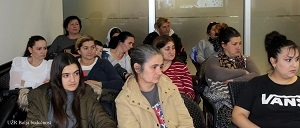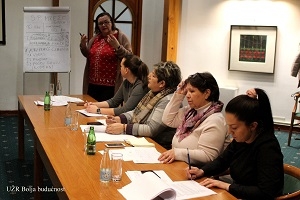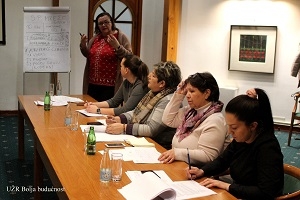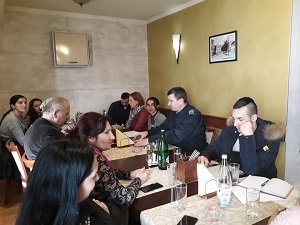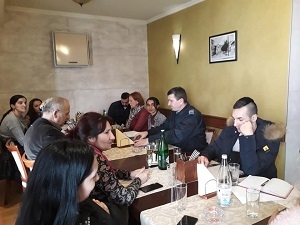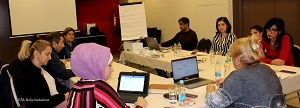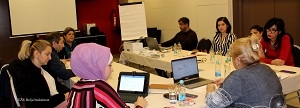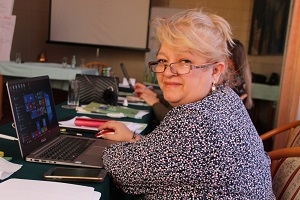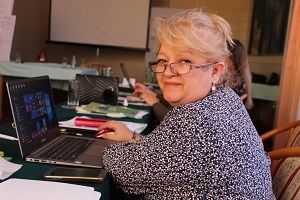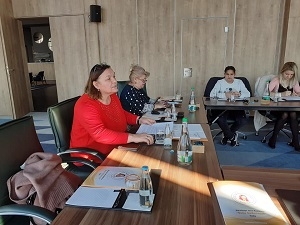Održana Skupština Udruženja žena Romkinja "Bolja budućnost" grada Tuzla
Od 2001. godine, kada je osnovano Udruženje žena Romkinja „Bolja budućnost“ Tuzla osvareni su veliki pomaci posebno u oblastima zdravlja Romkinja, zapošljavanja i informisanja o njihovim pravima. Ciljevi Udruženja žena Romkinja „Bolja budućnost“ Tuzla od početka su bili: borba protiv diskriminacije , uključivanje Romkinja u javni i politički život, zaštita romske djece i obrazovanje. Kontinuirano smo educirali Romkinje o njihovim pravima i ukazivali na to da trebaju biti ravnopravne sa muškarcima. U sve naše programe i projekte aktivno uključujemo našu korisničku grupu te zajedno realzujemo sve naše aktivnosti. Svake godine našim članicama i korisnicima/cama , te članicama Upravnog odbora prezentiramo naše aktivnosti i postignuća. S tim u vezi smo i početkom 2020 godine održali redovni izvještajnu Skupštinu udruženja na kojoj su usvojeni narativni godišnji i finansijski izvještaji te plan rada za 2020 godinu.
Roma Women's Network "Uspjeh " developed Strategy for period of 2020-2023
In the period from 05-08.02.2020, with support of Roma women association "Bolja buducnost" Tuzla and with the financial support of the OAK Foundation, the Roma Women's Network in BiH developed and adopted its strategic lines of action for the period 202-2023.The strategic and operational activities of the network are based on recommendations and measures from the Platform for the improvement of rights and status of Roma Women in BiH, which have been embraced into 19 strategic goals and 50 activities under this Strategy.
All activities are planned for the period 2020-2023, and are divided into the following areas: institutional capacity, combating discrimination and anti-Gypsyism, improving access to health and social care, social housing, employment, education and special forms of care, which should include adequate support services. .
Zenska romska mreza "uspjeh" izradila Strategiju za period 2020-2023
U periodu od od 05-08.02.2020 godine u organizaciji Udruzenja zena Romkinja "Bolja buducnost" grada Tuzla uz finansijsku podrsku OAK fondacije , zenska romska mreza "Uspjeh" u BiH je izradila i usvojila svoje strateske pravce djelovanja za period 202-2023 godine.
Strateško i operativno djelovanje ŽRM „Uspjeh“ zasniva se na preporukama i mjerama iz Platforme za unaprjedjenje prava i polozaja Romkinja u BiH koje su u okviru ove Strategije pretočene u 19 strateških ciljeva i 50 aktivnosti.
Sve aktivnosti planiraju se za period 2020-2023, a podijeljene su prema sljedećim oblastima: institucionalni kapaciteti, suzbijanje diskriminacije i anticiganizma, poboljšanje pristupa zdravstvenoj i socijalnoj zaštiti, socijalnom stanovanju, zapošljavanju, obrazovanju i posebnim oblicima zaštite koji treba da uključuju i adekvatne servise podrške.
Representatives of the institutions and community representatives held a joint planning meeting
As part of the regional project "For Active Inclusion and Rights of Roma Women in the Western Balkans III", supported by Austrian Development Cooperation through CARE INTERNATIONAL, Balkans, our association organized and facilitate a community planning meeting between representatives of institutions and the community, using a method "Community score card" .
In the previous period, separate meetings were held with representatives of the community and institutions where participants had the opportunity to identify priorities, but also difficulties in the implementation and resolution of certain status issues between service providers and those receiving and using those services. At this joint meeting, a plan for joint action in addressing specifically identified needs of the Roma community in the field of health and social care was agreed.
Predstavnici/e institucija i predstavnici/e zajednice odrzali zajednicki sastanak planiranja
U sklopu regionalnog projekta "Za aktivnu inkluziju i prava Romkinja na zapadnom Balkanu III" koji podrzava Austrijska razvojna saradnja kroz CARE INTERNATIONAL, Balkans, nase udruzenje je krosteci metodu rangiranja potrebe zajednice organizovalo i fascilitiralo zajednickim sastankom planiranja izmedju predstavnika/ca institucija i zajednice.
U ranijem periodu odrzani su zasebni sastanci sa predstavnicima/ca zajednice i institucija na kojima su ucesnici/e imali prilike identifikovati prioritete ali i poteskoce u realizaciji i rjesavanju odredjenih statusnih pitanja izmedju pruzaoca usluga i onih koji primaju i koriste te usluge. Na ovom zajednickom sastanku saglasen je plan zajednickog djelovanja u rjesavanju posebno identifikovanih potreba romske zajednice u oblasti zdravstvene i socijalne zastite.
Roma women network starts with preparatory activities for upcoming month of Roma women activism.
Roma Women 's Association "Bolja buducnost" Tuzla has organized a joint meeting of the Roma Women's Network to begin preparations for the campaign for a month of women' s activism in 2020. The meeting was held from 26-28. January 2020 with support from the OAK Foundation.The members of the Roma Women's Network have agreed on joint promotional materials and joint activities that will be implemented in the period from 08 March to 08 April 2020 under the slogan "It is my RIGHT, not a PRIVILEGE!".
Network members agreed that with this year's campaign wants to point out that Roma women have the right to make decisions on their own behalf, to participate in decision-making process, to have a place in society, and to have the right to political participation.
Započele pripremne aktivnosti zenske romske mreze BiH za provodjenje mjesec dana zenskog romskog aktivizma
Udruzenje zena Romkinja "Bolja buducnost" Tuzla je organizovalo zajednicki sastanak zenske romske mreze "Uspjeh" kako bi zapoceli na pripremama za provodjenje kampanje mjesec dana zenskog romskog aktivizma u 2020 godini. Sastanak je odrzan u periodu od 26-28. Januara 2020 uz podrsku OAK fondacije. Članice zenske romske mreze su usaglasile zajednicke promotivne materijale i zajednicke aktivnosti koje ce biti implementirane u periodu od 08, Marta do 08. Aprila 2020 godine pod sloganom "Moje je PRAVO, a ne PRIVILEGIJA!.
Clanice mreže su se slozile da ovogodišnjom kampanjom žele da poruče kako Romkinje imaju pravo da donose odluke u svoje ime, da participiraju na mjestima odlučivanja, da ostvare svoje mjesto u društvu, te da imaju pravo na političku participaciju.
“Who and what are the Others in BiH?”
Indira Bajramović is the director of the Association of Roma people “Better Future” from the city Tuzla, who advocates for the better position of Roma children, women and little girls as well as other vulnerable categories of society. Association of Roma women “Better Future” is one of the members of the Initiative “Women Citizens for Constitutional Reform”. We discussed with Indira Bajramović on the constitutional reforms and recommendations for improvement of the position of women and girls in BH society with the special emphasize on the national and other minority groups.
How do you see political situation in BiH in relation to women and girls, what is their position and is there any improvement or aggravation?
“I think that women in BiH are insufficiently represented in politics and there are none of them in the decision making positions. Women are faced with mobbing and they are still working the same amount of time as men but are underpaid. In addition, I believe that women are discriminated in BiH in various ways and suffer torture not only by their families but also by employers and society. When it comes to women the laws are not enough respected including convention and all other documents that protect women. They are often discouraged to achieve their professional goals by the hand of men.
When it comes to girls I think they have bad role models (coming from different realities) on TV and are often not protected from the boys in school and on the street. Some of them get married very early (or are more often in civil partnership) under pressure of parents, do not finish school which at the end reflects in their later life because they face with violence, insulting and they are especially not concurrent at the labor market and are not economically independent.
Thanks to the work of NGOs we can say that there is some improvement but we are not certainly satisfied because it can be better. Institutions should work on protection of women, girls and little girls and to use available mechanisms. Law on Gender Equality of BiH, Election Law and all other documents and conventions in relation to little girls (children) should be implemented. I believe that international organizations and NGOs in cooperation with institutions can contribute for this position of women and girls to be changed. There are some changes, but we all have a lot to do to achieve for the women to be equal and equally participate in all spheres of our society”.
What do you think on constitutional reforms in BiH having in mind national minorities and/or other minorities? Can you provide us with short review on how this reflects on women and especially Roma women?
“I think that the Constitution of BiH is discriminatory in relation to not only national minorities but also to others who do not affiliate as one of the constituent peoples in BiH. In the Constitution of BiH it states the category Others – who and what are the Others? In BiH lives 17 confirmed national minorities whereas the Roma national minority is the largest so I do not understand why Constitution mentions only constituent peoples? Why are they the only who are constituent and who decided that they solely be constituent? I think that Constitution of BiH as the most important document of a state in this case our BiH is not in favor of women because we all know that the laws at the lower levels should be in accordance with the Constitution. The additional problem are entities and cantons that once again have their Constitutions and laws which are by the way different. So if we come to the local level we have the problem of the harmonization of the different documents with implementation of the basic human rights and I have already mentioned that laws are not exactly implemented in the field”.
How does it look like every-day fight for the better position of women in our society?
“I am fully engaged when it comes to my job and I am rarely at home. I often travel but I was the one who decided to do this job and to give my contribution to every activity if possible in order for the problem and unequal position of women and girls, especially Roma women and other vulnerable categories to be visible. I give my efforts in writing different reports, documents regarding women and girls but also in other fields. I travel outside BiH to conferences and there I speak on the position of women and girls in BiH, on how much they use mechanisms for protection of human rights, mechanisms against discrimination and domestic violence. We exchange experiences with other countries in neighbor and wider because I believe that our voice has to be heard and we have to impose with our requests if we want changes. In addition, I talk a lot, do the research and sometimes I have the feeling that I need more time during one day for everything that needs to be done. When I am at home I tried to spend quality time with my family”.
Can you mention minimum three items that endanger your constitutional rights that should be guaranteed?
„If I can choose, that I should have the chance to elect and be elected as national minority and our Constitution of BiH does not allow the same. The Constitution states that it guarantees the rights to all citizens but it is not so because at every turn the rights are violated to some citizen. I think that our Constitution of BiH should be civil, because at the moment it is not, and that all citizens should be protected by this highest legislative document.
“Ko su ili šta su Ostali u BiH?“
Indira Bajramović direktorica je Udruženja žena Romkinja “Bolja budućnost“ grada Tuzla koje se zalaže za poboljšanje položaja romske djece, žena i djevojčica kao i ostalih ranjivih kategorija. Udruženje žena Romkinja “Bolja budućnost” je jedna od članica Inicijative “Građanke za ustavne promjene”. Razgovarale smo s Indirom Bajramović o ustavnim reformama i preporukama za poboljšanje položaja žena i djevojčica u bh. društvu s posebnim fokusom na nacionalne i druge manjinske grupe.
Kako ocijenjujete političku situaciju u BiH u odnosu na žene i djevojčice, kakav je njihov položaj i ima li nekih poboljšanja ili pogoršanja?
“Mislim da su su žene u BiH nedovoljno zastupljene u politici, da ih nema na mjestima gdje se donose odluke. Nad ženama se vrši mobing, kao i da nažalost još uvijek rade više ili isto kao i muškarci, a za to su manje plaćene. Također, mislim da su žene u BiH diskriminisane na više načina i da trpe torturu ne samo od porodice, nego poslodavca i društva. Kada su žene u pitanju vrlo često se ne poštuju zakoni, konvencije i sva druga dokumenta koja štite žene. Često su opstruisane da napreduju u karijeri i radu od strane muškaraca.
Kada govorimo o djevojčicama mislim da imaju loše uzore (razni reality) na TV, vrlo često nisu zaštićene od dječaka u školi i na ulici. Neke stupaju rano u bračnu (bolje rečeno u vanbračnu zajednicu) pod pritiskom roditelja, ne završavaju školu, to se na kraju negativno odražava u njihovom daljem životu jer trpe nasilje, vrijeđanja, a posebno nisu konkuretne na tržištu rada i ekonomski su ovisne.
Zahvaljujući radu NVO-a možemo reći da ima poboljšanja, ali svakako da nismo zadovoljne jer može to i bolje. Institucije trebaju da rade na zaštiti žena, djevojaka i djevojčica, te da se koriste dostupni mehanizmi. Treba da se poštuje Zakon o ravnopravnosti spolova BiH, Izborni zakon i svi drugi dokumenti i konvencije kada govorimo o djevojčicama (djeci). Mislim da međunarodne organizacije i NVO u saradnji sa institucijama, mogu doprinjeti da se ovakav položaj žena i djevojaka promjeni. Promjena ima, ali svi imamo još dosta posla da postignemo da su žene ravnopravne i da ravnopravno učestvuju u svim sferama našeg društva.“
Šta mislite o ustavnim reformama u BiH po pitanju nacionalnih manjina i/ili drugih manjina? Možete li nam dati kratki osvrt kako se to reflektuje na žene, osobito žene Romkinje?
“Mislim da je Ustav BiH diskriminirajući u odnosu ne samo na nacionalne manjine, nego i na druge koji se ne izjašnjavaju kao jedan od konstitutivnih naroda u BiH. U Ustavu BiH piše Ostali –ko su ili šta su Ostali? U BiH živi 17 priznatih nacionalnih manjina od kojih je romska nacionalna manjina najbrojnija i ne shvatam zašto samo tri konstitutivna naroda. Po čemu su oni konstitutivni, ko je odlučio da baš oni budu konstitutivni? Mislim da i sam Ustav BiH kao najvažniji dokument jedne države u ovom slučaju naše BiH, baš i ne ide u prilog ženama jer znamo da bi se svi zakoni na nižim nivoima trebali donositi u skladu sa Ustavom. Dodatni problem predstavljaju entiteti i kantoni koji opet imaju svoje Ustave i zakone, a koji su uzgred različiti i dok dođemo do lokalnog nivoa imamo problem sa harmonizacijom istih, sa ostvarivanjem osnovnih ljudskih prava, a već gore sam pomenula da se zakoni baš i ne primjenjuju u praksi.“
Kako izgleda vaša svakodnevna borba za bolji položaj žena u našem društva?
“Ja sam puno angažovana kroz svoj posao i rijetko sam kod kuće. Stalno sam na putu, ali ja sam izabrala da se bavim ovim poslom i da dam svoj doprinos u svakoj aktivnosti gdje mogu, kako bi pitanje i neravnopravan položaj žena i djevojaka, a posebno Romkinja i drugih ranjivih kategorija bilo vidljivo. Dajem svoj doprinos u pisanju raznih izvještaja, dokumenata koji se tiču žena i djevojaka, ali i drugih bitnih tema. Idem često van granica BiH na konferencije i tamo govorim o položaju žena i djevojaka u BiH, o tome koliko one koriste mehanizme za zaštitu ljudskih prava, mehanizme protiv diskriminacije i nasilja u porodici. Razmjenjujemo iskustva sa drugim zemljama kako u regiji tako i šire jer mislim da se naš glas mora čuti i moramo se nametnuti sa našim zahtjevima ako želimo promjene. Pored toga puno zagovaram, istražujem i nekad imam osjećaj da mi fali vremena tokom jednog dana za sve što moram uraditi. Kad sam kod kuće pokušavam vrijeme provesti sa porodicom.“
Navedite nam minimalno tri stavke koje ugrožavaju vaša ustavna prava koja bi trebalo da vam budu garantirana?
“Pa ako možemo da biramo, onda bi trebalo da možemo biti i birani kao nacionalne manjine, a naš Ustav BiH to ne dozvoljava. Ako u Ustavu BiH stoji da garantuje prava svim građanima to se baš ne bi reklo, jer na svakom koraku nekom građaninu ili građanki se krše prava. Mislim da naš Ustav BiH treba da bude građanski jer sada to nije i da uistinu svi građani/ke budu zaštićeni Ustavom BiH.“
Da li vjerujete u promjene Ustava BiH? Koje su vaše preporuke za ubrzanje tog procesa?
“Što prije to bolje jer ovako ne ide! Mislim da se Ustavom mogu regulisati mnoga pitanja kada je država i rukovodstvo iste u pitanju, ali naravno i druga važna pitanja.”
Intervju vodila: Vildana Džekman, aktivistkinja i feministkinja Fondacija CURE i PR Inicijative “Građanke za ustavne promjene“
A Platform for the improvement of the rights and status of Roma women in Bosnia and Herzegovina
Association of Roma Women "Bolja buducnost " from Tuzla and Roma women network , have started the development of a Platform for the improvement of the rights and status of Roma Women in Bosnia and Herzegovina. The platform is an advocacy instrument for the rights of Roma women at the domestic and international level, which is a concrete contribution to the policy of anti-Gypsyism and combating discrimination in BiH society. Pointing to the efforts and shortcomings in BiH policies related to Roma and Roma integration, the Platform is a mechanism to advocate for a more effective practice of recognizing, monitoring and preventing various forms of discrimination against Roma women.
Generally, the Platform emphasizes the identified shortcomings in other sectoral strategies, plans and policies in Bosnia and Herzegovina. Following various analyzes and other available indicators, key problems and obstacles to better inclusion of Roma women in BiH society were highlighted. The Platform proposes more concrete measures to improve the implementation of the parts of sectoral strategies, plans and policies that are important for the realization of the economic, social, political, educational, cultural and other rights of Roma women in Bosnia and Herzegovina.
In the Platform, we highlight specific problems and make recommendations regarding the political and social participation of Roma women, social protection, education and cultural rights, gender-based violence and domestic violence, exploitation of children (especially women) through arranged marriages and endangering development and health due to the higher index of minor pregnancies in the Roma community in relation to the non-Roma population and the increased risk of discrimination and lack of systematic support.
Activities for developing this Platfor is lead by the Association of Roma Women "Bolja buducnost" in cooperation with the Roma women network BiH. A ctive participation in the development was provided by: Ministry of Human Rights and Refugees of BiH, Agency for Gender Equality of BiH, Gender Center of the Federation of BiH , Women's Network BiH, Association for the Promotion of Roma Education "Otaharin" BiH, Care International Balkans, OSCE Missions in Bosnia and Herzegovina with the intention to support and participate in the creation of a common framework of action to improve the rights and status of Roma women in BiH society as a whole. OAK Foundation, UN Women and Kvinna till Kvinna provided financial support to the process of creating this Platform.

